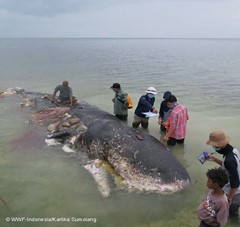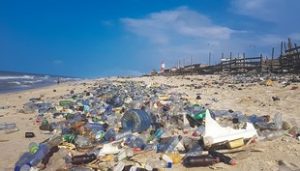23 The Biggest Threat to Tourism – Seulgi Chung
Author: Seulgi Chung, Pima Community College

Fig 1. A dead whale found in Indonesia from Kartika Sumolang. 19 Nov. 2018. WWF-Indonesia via twitter. twitter.com/WWF_ID/status/1064667483359985665. |
In 2018, a dead whale had been found in a popular tourist area in Indonesia. The cause of death? Veterinarians found out more than 13.2 pounds of plastic waste in its stomach. It included “bags, plastic bottles, sandals, 115 plastic cups, and a sack containing more than 1,000 pieces of string in its stomach” (Guy). This tragic story is not the first time. The same tragedies are happening all over the world.
Tourism is not as eco-friendly as we think. Tourism involves inevitably environmental pollution since most of its activities take place in the natural environment like mountains, rivers, and oceans. For instance, tourist facilities damage wild animals’ habitats, tourists’ groups generate a lot of litter and leave it behind, and airplanes and rental cars pollute the air by emitting carbon. Among some environmental pollution caused by tourism, I would like to talk about the most serious and urgent issue in the tourism industry today: Plastics waste in the ocean.
Plastic wastes are easily found in tourist areas and are directly related to marine pollution. Many studies and statistics have proven this. Ellen MacArthur’s report calculates that “there are over 150 million tons of plastics in the ocean today and at this rate, there will be more plastics than fish in the ocean by 2050” (“The New Plastics”). Worldwide Fund for Nature estimates that marine litter in the Mediterranean, where over 200 million tourists visit each year, increases by 40% during summer each year. And most of them are floating in the oceans and lying on Mediterranean beaches (“Plastic in”). This can be a huge threat to not only the lives of animals but also local communities.
Most of all, plastic wastes are damaging to marine life. They have flowed into the sea from the beach area, eventually becoming huge garbage islands. Unfortunately, it takes hundreds of years for these wastes to naturally decompose. This can be fatal to marine mammals. WWF research estimates that more than 50% of fish have consumed indigestible plastic wastes. Especially, the marine mammals mistake plastic bag as food because a plastic bag ballooned in the water look like a moving squid (“Plastic in”).
 |
This problem also negatively affects our communities, as the cleanness of the tourist destination is correlated to the revenue of the local tourism industry. South African research team has revealed how much cleanliness of beaches is directly related to the attractiveness of the destinations. According to this research, 95% of tourists and residents answered that they would not go to a beach with more than 10 or more large debris of litter per meter (Ballancea, et al. 211). Polluted beaches no longer attract tourists, which can lead to economic loss in local tourism community. The best example is Boracay beach in the Philippines. The area had closed for 6 months because of continual waste management problems and poor environmental policies. This closure has cost the local economy and workers in lost revenue (Haynes). It must be prevented since it takes numerous time and cost to recover the area, once destroyed.
Therefore, we all should respond to this urgent issue immediately by setting strong regulations and on plastic usage in tourist areas. First, tourism organizations and local governments should eliminate unnecessary plastic packaging and take action on reusable alternative by 2025 following the guidance of UNEP and UNWTO’s The Global Tourism Plastics Initiative. The voluntary participation also has an important role to play. Tourists should carry their own water bottles and reusable bags when traveling. Hotels and restaurants should replace from single-use plastic items to reusable items like small shampoo bottles and straws.
We should act right now so that humans lose no more marine life and beautiful beaches. Many are warning of the dangers of plastic waste. If we ignore this warning, it is unsure how much more time humans have left being able to enjoy white sandy beaches and blue sea.
Works Cited
Ballancea, A, et al. “How much is a clean beach worth? The impact of litter on beach users in the Cape Peninsula, South Africa.” South African Journal of Science, pp.210-213. May. 2000. doi:10.10520/AJA00382353_8975.
Chasant, Muntaka. ” Plastic Pollution covering Accra beach.” Wikimedia commons, 3 Oct. 2018, commons.wikimedia.org/wiki/File:Plastic_Pollution_in_Ghana.jpg.
Ellen MacArthur Foundation. “The New Plastics Economy: Rethinking the Future of Plastics.” Dec. 2017. www.ellenmacarthurfoundation.org.
Guy, Jack. Dead whale in Indonesia had swallowed 1,000 pieces of plastic.”, CNN, 11 Nov. 2018, cnn.com/2018/11/20/asia/indonesia-whale-plastic-scli-intl/index.html.
Haynes, Suyin. “Boracay Islanders Feel the Pinch After the Philippines Shuts Down a Top Tourist Destination.” TIME, 15 May. 2018, time.com/5262455/boracay-island- philippines-tourists-closure-duterte.
Reyes, Celia, et al. “The Boracay Closure: Socioeconomic Consequences and Resilience Management.” Philippine Institute for Development Studies Discussion Papers, Dec. 2018, pidswebs.pids.gov.ph/CDN/PUBLICATIONS/pidsdps1837.
Sumolang, Kartika. Photograph of A dead whale found in Indonesia. 19 Nov. 2018, WWF Indonesia Twitter, www. twitter.com/WWF_ID/status/1064667483359985665.
UNEP. “Tourism to tackle plastic pollution with new commitment.” 29 Jan. 2020, www. unep.org/news-and-stories/story/tourism-tackle-plastic-pollution-new-commitment.
Worldwide Fund for Nature. “Plastic in our oceans is killing marine mammals.” 1 Jul. 2021, ww.org.au/news/blogs/plastic-in-our-oceans-is-killing-marine-mammals#gs.62563s.
